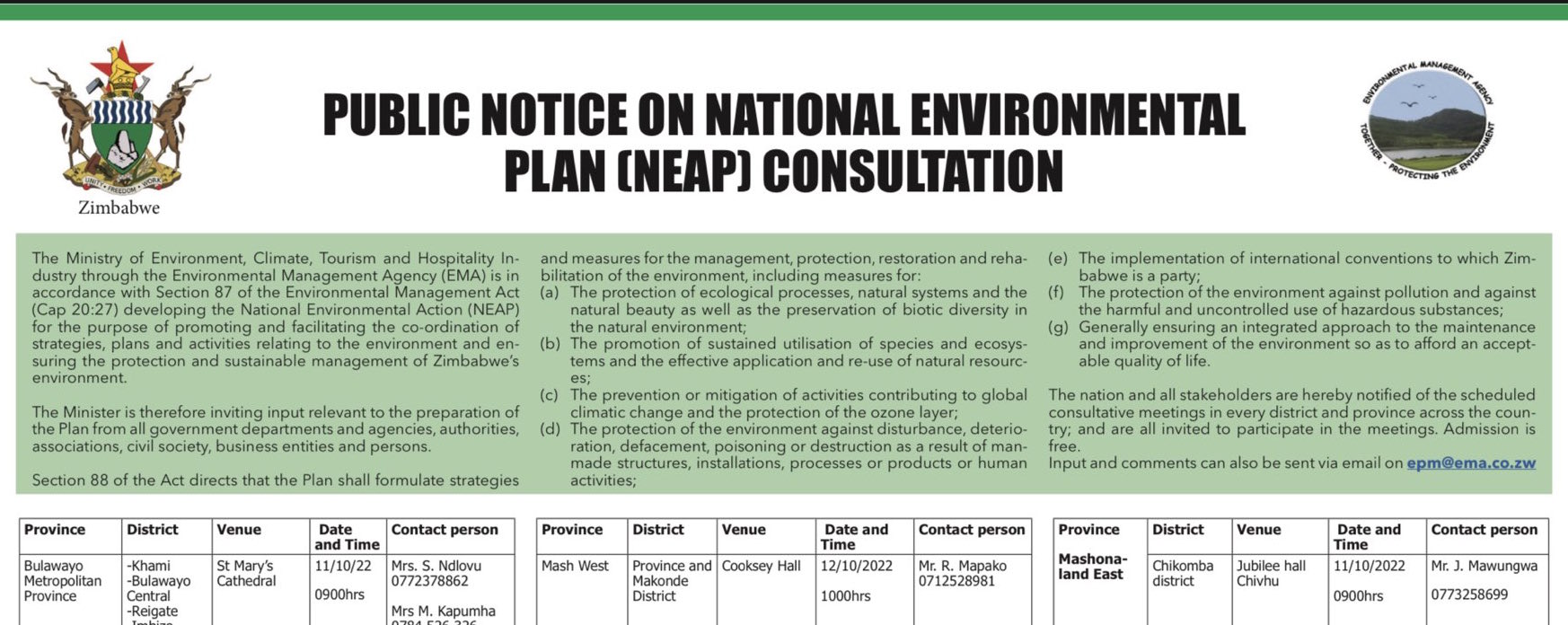By Nhau Mangirazi
HURUNGWE – Zimbabwe must have modalities for protecting the environment from harmful chemical spillage along the Harare-Chirundu highway. This came out during the National Environment Action Plan (NEAP) consultative meeting in Hurungwe where participants said the chemicals are dangerous to humans, wildlife, and the environment.
Albert Sande from Kariba Redd (Carbon Green Africa) said Hurungwe is getting some of these spillages along the highway.
‘‘Some of the chemicals are harmful to humans, wildlife, and the environment. NEAP must take this into account and have governing laws from local authorities implemented nationally.
‘‘We must be watchful of our environment as we get toward a clean environment through the global movement of the action plan,’’ he said.
Environmental Management Agency district officer for Hurungwe, Zvinodashe Rugata, said there are challenges in waste management in the Hurungwe district.
‘‘Generally, Hurungwe has no major industries that may pollute the environment but regrettably, some of the chemicals that spill along the Harare-Chirundu highway are a great danger to our environment and affects the ecosystem. These include sulphur among other toxic chemicals that are carried from South Africa to the Democratic Republic of Congo among other countries,’’ said Rugata.
Hurungwe district development coordinator, Andrew Tizora, said there is a need to work overdrive to make submissions on time.
‘‘As a district, we must make our submissions over the weekend so that they are taken on board for future generations,’’ said Tizora.
According to the 72-page draft document by the environment ministry, Zimbabwe has aligned its development agenda to the Sustainable Development Goals and Vision 2030 and subscribes to the implementation of policies that promote a green economy.
‘‘A green economy is one that results in improved human well-being and social equity, while significantly reducing environmental risks and ecological scarcities,’ reads part of the document.
The country’s road network is of strategic importance in enhancing accessibility as well as promoting domestic and regional trade as a key transport corridor. The priority is to ensure that the assets are rehabilitated and preserved.
‘‘However, the economic challenges experienced since 2000 have affected the ability of the country to ensure continuous and sustained rehabilitation and maintenance of transport infrastructure (rail, road, air, and inland boats).
‘‘Additionally, over-reliance on road transportation has been putting pressure on already depreciated road networks, requiring extensive rehabilitation.
Road development in Zimbabwe does not make provisions for non-motorized transport and hence there is increasing demand for motorized transport systems. Additionally, Zimbabwe has a growing, but aged vehicle fleet, comprising mainly of second-hand vehicles, poor road conditions resulting in fuel wastage and traffic congestion,’’ says the document.
It further adds that the transport sector is known as the main source of air pollution in African cities.
‘‘In Zimbabwe, 12 percent of the emissions in 2015 were from the transport sector. Transport-related air pollution causes damage to humans, the biosphere, soil, water, buildings, and materials. The most important pollutants from the sector: Particulate matter (PM10, PM2.5); Nitrogen oxides (NOx); Sulphur oxide (SO2 ); Ozone (O3 ); Volatile organic compounds (VOC). These emissions contribute to air pollution and climate change, noise causes nuisance and health risks and transport infrastructure has serious impacts on landscapes and ecosystems causing habitat fragmentation and affecting wildlife and even human populations.
‘In addition to these impacts on the environment, transport has also other severe impacts on society. Annually thousands of people are killed and injured in accidents and in various densely populated areas, high traffic congestion levels result in time losses,’’ reads the draft document.
The meeting was attended by officials from Karoi town and Hurungwe rural district councils, Chirundu Local Board, Chiefs Chundu and Chanetsa, and officers from government ministries.






